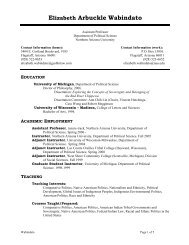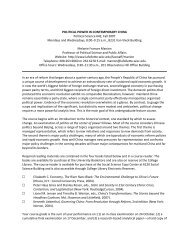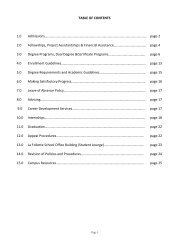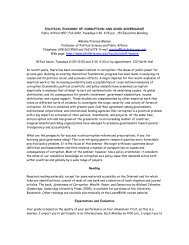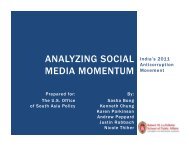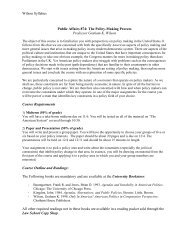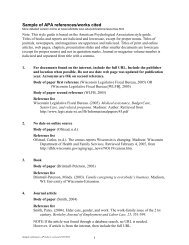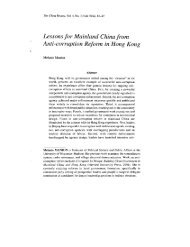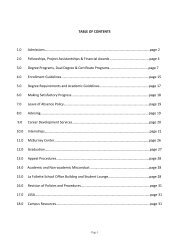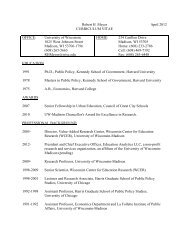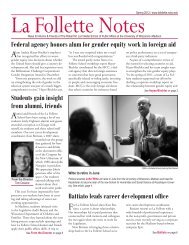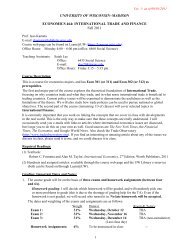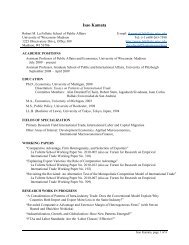SAVE Commission's findings - La Follette School of Public Affairs ...
SAVE Commission's findings - La Follette School of Public Affairs ...
SAVE Commission's findings - La Follette School of Public Affairs ...
You also want an ePaper? Increase the reach of your titles
YUMPU automatically turns print PDFs into web optimized ePapers that Google loves.
A comprehensive family maintenance system<br />
also makes sense, perhaps administered by<br />
a single agency for a county on a competitive<br />
basis, open to public employees, the private<br />
sector and not-for-pr<strong>of</strong>it organizations, assuming<br />
there is a “level playing field” allowing fair<br />
treatment for all.<br />
R E S U L T S<br />
EFFECTIVENESS<br />
In successful re-engineering, a required<br />
question is whether the system itself is bad. The<br />
courts are tradition-honored processes in a time<br />
<strong>of</strong> rapid change. Finding answers to basic systems<br />
questions may be difficult because the<br />
courts are not only distant from other branches,<br />
but they also don’t have the same sense <strong>of</strong> need<br />
for change.<br />
The courts and other branches should<br />
strategically plan, sometimes together. From a<br />
technological standpoint alone, the planning is<br />
badly needed. Scientific evidence is valued as<br />
much as eye-witness accounts. Tools such as<br />
virtual reality, animation and genetic testing are<br />
dismantling the paperdriven<br />
system. Historically,<br />
courts lag behind<br />
science and the recent<br />
Carnegie Commission<br />
suggests wise steps.<br />
Government growth<br />
is slowing. The courts<br />
should ask the question other branches must ask:<br />
how do we get out <strong>of</strong> this business? For the<br />
courts, that is a huge question to undertake,<br />
since it means taking steps to reduce the level<br />
<strong>of</strong> litigation.<br />
The legal pr<strong>of</strong>ession and the Legislature<br />
should reflect on whether some practices, such<br />
Focusing on the judicial<br />
branch will:<br />
1 Treat the judicial branch with the<br />
same management scrutiny as<br />
other branches.<br />
2 Bring it as a full partner into the<br />
technology age.<br />
“The judiciary generally escapes<br />
reform efforts, but is a major<br />
cost factor.”<br />
Joe Martin, Arthur Andersen and Co.<br />
as large awards for punitive damage, encourage<br />
lawsuits and detract from the credibility <strong>of</strong><br />
the system. They also should study how to cooperate<br />
on issues such as sentencing laws to<br />
determine their true costs before implementation.<br />
Together, the branches should look for<br />
answers to shared questions that have their origins<br />
in science and technology, such as those<br />
involving computer crime and the human<br />
gnome. Not all legislatures and courts are prepared<br />
to debate science and related ethics issues.<br />
RESPONSIBILITIES WITH RIGHTS<br />
Another challenge is the way people view<br />
the whole legal and political system. Currently,<br />
the court’s role is defined in terms <strong>of</strong> rights.<br />
But we have to ask how our Founders wanted<br />
to deal with responsibilities to balance those<br />
rights. That is a question for public dialogue<br />
that the legal pr<strong>of</strong>ession should ponder.<br />
Another part <strong>of</strong> that dialogue might explore<br />
whether law is<br />
the modern equivalent<br />
<strong>of</strong> lowest common<br />
denominator<br />
morality. If so, does<br />
the legal pr<strong>of</strong>ession<br />
have an obligation to<br />
discuss how to take<br />
higher ethical ground or encourage resolving<br />
issues outside the court, through conflict resolution<br />
or mediation for the sake <strong>of</strong> community<br />
fabric? Might the attorneys also lead a discussion<br />
on the long-term effects <strong>of</strong> pursuing personal,<br />
rather than community, happiness?<br />
3 Move the courts from a paper<br />
based system to an electronic<br />
based system.<br />
4 Reduce turf battles among state<br />
courts.<br />
5 Save taxpayers money as hightech<br />
efficiencies are implemented.<br />
6 Streamline delivery <strong>of</strong> social<br />
services to families to avoid<br />
duplication and waste.<br />
22.3<br />
Address artificial<br />
barriers that discourage<br />
efficiency.<br />
22.4<br />
Examine the concept <strong>of</strong><br />
responsibilities with<br />
rights.<br />
22.5<br />
Aggressively develop a<br />
state alternative dispute<br />
resolution strategy.<br />
22.6<br />
Address juvenile crime<br />
and violence.<br />
22.7<br />
Provide adequate<br />
information to justice<br />
system pr<strong>of</strong>essionals.<br />
22.8<br />
Calculate the costs <strong>of</strong><br />
crime and punishment.<br />
22.9<br />
Evaluate new ways <strong>of</strong><br />
securing funding for<br />
courts.<br />
22.10<br />
Adopt a competitively<br />
driven social services<br />
model.<br />
22.11<br />
Place the court system<br />
on a sum certain<br />
budget.<br />
22.12<br />
Eliminate archaic<br />
procedural requirements.<br />
CITIZEN • COMMUNITY • GOVERNMENT — WISCONSIN: THE 21 ST CENTURY 59



